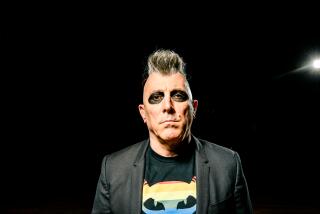PRIMUS : Left-of-Center Band Has Faith in Alternative Rock
- Share via
Q uirky . . . wacky . . . herky-jerky . Those are the kind of words used most often to describe the music of the Berkeley-based trio Primus, as showcased on the new album “Sailing the Seas of Cheese.”
“All the words that end in y ,” observed the band’s creative force Les Claypool, sitting in a Hollywood hotel room recently.
So how does a band like that become the hottest thing in the alternative music world? Beats Claypool.
“It’s a bit surprising for us, ‘cause we’d been in Europe since the album came out,” said the long, lean musician.
That “Cheese” had made Primus--which plays the Palace on Thursday--the Big Cheese of American alternative music became apparent at the recent “Gathering of the Tribes” festival at the Pacific Amphitheatre. When Claypool, guitarist Larry Lalonde and drummer Tim (Herb) Alexander hit the stage, many fans climbed over their chairs to rush forward, a sight reminiscent in tone, if not scale, of Metallica’s upstart set at 1988’s “Monsters of Rock” show at the L.A. Coliseum.
“We get back from Europe and do those shows and get that reaction, and it gave me that warm, tingly feeling,” said the dryly witty Claypool, 27.
Claypool seems doubtful about Primus’ prospects for Metallica-level success--though it makes a cameo appearance in the mainstream film “Bill and Ted’s Bogus Journey.” The band he formed on his 21st birthday is just a little too left-of-center for the stadium crowds. With influences ranging from Brian Eno to Rush, and a sound centered on Claypool’s art-funk bass playing and curious lyrical imagery, Primus falls closer to avant-rockers Pere Ubu than any new-metal gods.
But Claypool has watched with interest as another offbeat Bay Area band has climbed the commercial ladder: Faith No More, an outfit that just a couple of years ago was sharing small-club bills with Primus. Faith’s success gave him great hope, not so much for his own future, but for the musical climate.
“It was a sense of, ‘Hey! This is cool music and it’s about time people got into it,’ ” he said. “It seems people are being more receptive to alternative sounds. Maybe I’m just getting older, but it’s making the left-hand turn.”
More to Read
The biggest entertainment stories
Get our big stories about Hollywood, film, television, music, arts, culture and more right in your inbox as soon as they publish.
You may occasionally receive promotional content from the Los Angeles Times.










